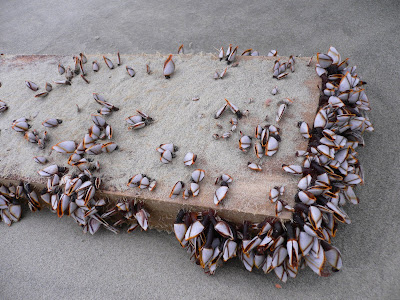*********** disturbing/graphic content to follow ***********
Paige and I emerge from the quad. It's not quite early morning but not late yet. Today reminds us of yesterday, sunny breezy, pleasant. We're going to meet Fr. Marc to go into town. Not ten steps from the building, a woman streaks by us, wailing, her hands in her hair, elbows akimbo. Then we hear more shrieks -- shrieks that can only mean that someone has died.
As we pass the clinic, we see a quickly growing crowd and in the midst, a white sheet covering what can only be a body. Security is quickly rounding up children and depositing them in the primary school. Fr. Marc is looking on with a solemn face, standing near the covered body. Later, when he comes over to sit with us under the mango tree, where we have self-consciously retreated, we will learn all the details.
One of the upper administrative staff guides Matante back to her home, she is calling out to God. Another staff member steps away and calls our lawyer, the local authorities and a funeral home. The body will not be removed until it is declared officially dead by the proper authorities. This will hopefully happen sooner rather than later, given that we have 400 curious children to worry about.
Finally, Fr. Marc joins our quiet twosome. I ask him what happen. And he replies,
"Israel died. A seventh grader. You knew him... 16 years old..." he trails off. After a moment, he collects his thoughts and delivers the rest of the story, as he's learned it. His parents are dead. His aunt, with whom he lived, said that last night he was very sick, vomiting blood. This morning he came to Pwoje Espwa to pick up his report card from the secondary school. Then, he and his aunt were hoping to get a ride in one of Espwa's vehicles to the hospital, since the boy could barely stand.
So they waited by the clinic. One of the drivers was summoned and he came expeditiously in a truck. Before he even reached the yard in front of the clinic, the boy collapsed, the rest of the contents of his stomach - and maybe even his stomach itself - were pouring from his nose and mouth. He was dead.
In the U.S., Fr. Marc reflects, this bright young kid might not have died. He would have gone to the hospital the night before, maybe sooner. We don't know yet, nor might we ever, why he died exactly. The doctor didn't seem to know. It all seems surreal -- but it's so real. Painfully real.
I watch as Marc calls over one of Israel's classmates.
"Was he your friend?" he asks.
"Yes," the boy answers, his eyes red.
"Was he sick?"
"I don't know..."
Then Marc pauss, thinking. "Did he have siblings?"
"I think so..."
Behind us, more and more villagers from Madame Combe march through our gate to see their deceased neighbor and stand with his family. The lawyer shows up a few minutes later and mercifully, the state official does too.
As we pass the clinic, we see a quickly growing crowd and in the midst, a white sheet covering what can only be a body. Security is quickly rounding up children and depositing them in the primary school. Fr. Marc is looking on with a solemn face, standing near the covered body. Later, when he comes over to sit with us under the mango tree, where we have self-consciously retreated, we will learn all the details.
One of the upper administrative staff guides Matante back to her home, she is calling out to God. Another staff member steps away and calls our lawyer, the local authorities and a funeral home. The body will not be removed until it is declared officially dead by the proper authorities. This will hopefully happen sooner rather than later, given that we have 400 curious children to worry about.
Finally, Fr. Marc joins our quiet twosome. I ask him what happen. And he replies,
"Israel died. A seventh grader. You knew him... 16 years old..." he trails off. After a moment, he collects his thoughts and delivers the rest of the story, as he's learned it. His parents are dead. His aunt, with whom he lived, said that last night he was very sick, vomiting blood. This morning he came to Pwoje Espwa to pick up his report card from the secondary school. Then, he and his aunt were hoping to get a ride in one of Espwa's vehicles to the hospital, since the boy could barely stand.
So they waited by the clinic. One of the drivers was summoned and he came expeditiously in a truck. Before he even reached the yard in front of the clinic, the boy collapsed, the rest of the contents of his stomach - and maybe even his stomach itself - were pouring from his nose and mouth. He was dead.
In the U.S., Fr. Marc reflects, this bright young kid might not have died. He would have gone to the hospital the night before, maybe sooner. We don't know yet, nor might we ever, why he died exactly. The doctor didn't seem to know. It all seems surreal -- but it's so real. Painfully real.
I watch as Marc calls over one of Israel's classmates.
"Was he your friend?" he asks.
"Yes," the boy answers, his eyes red.
"Was he sick?"
"I don't know..."
Then Marc pauss, thinking. "Did he have siblings?"
"I think so..."
Behind us, more and more villagers from Madame Combe march through our gate to see their deceased neighbor and stand with his family. The lawyer shows up a few minutes later and mercifully, the state official does too.
**************
Please keep Israel, his family and his friends in your prayers.

















